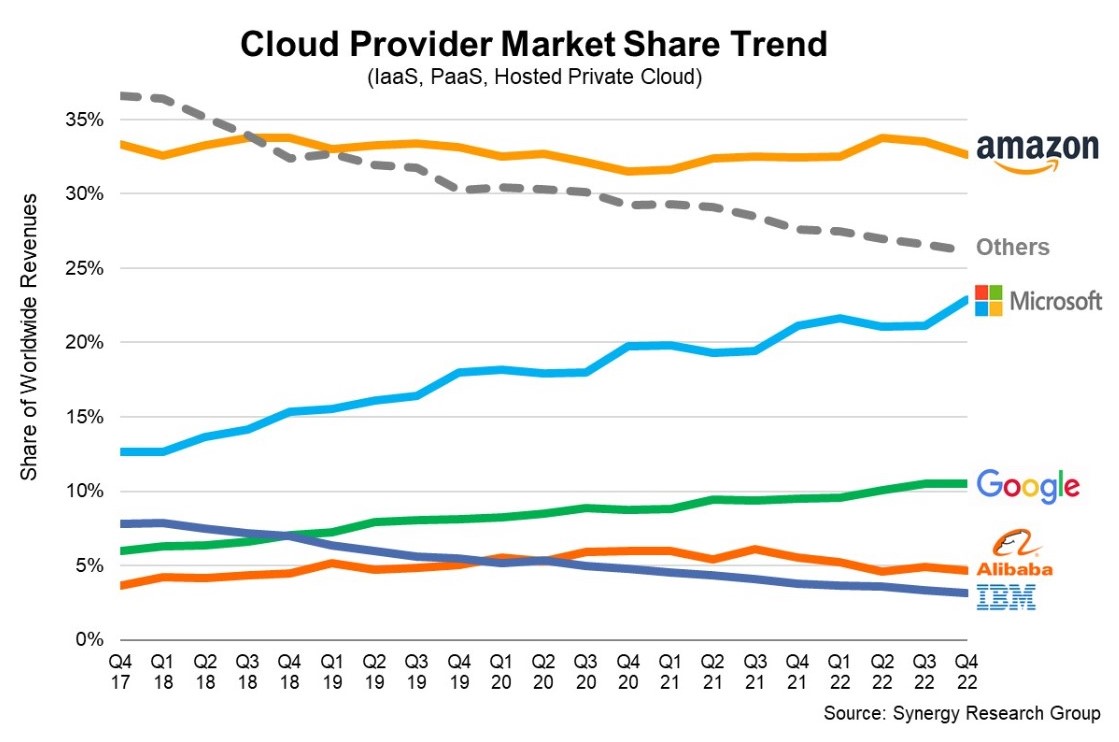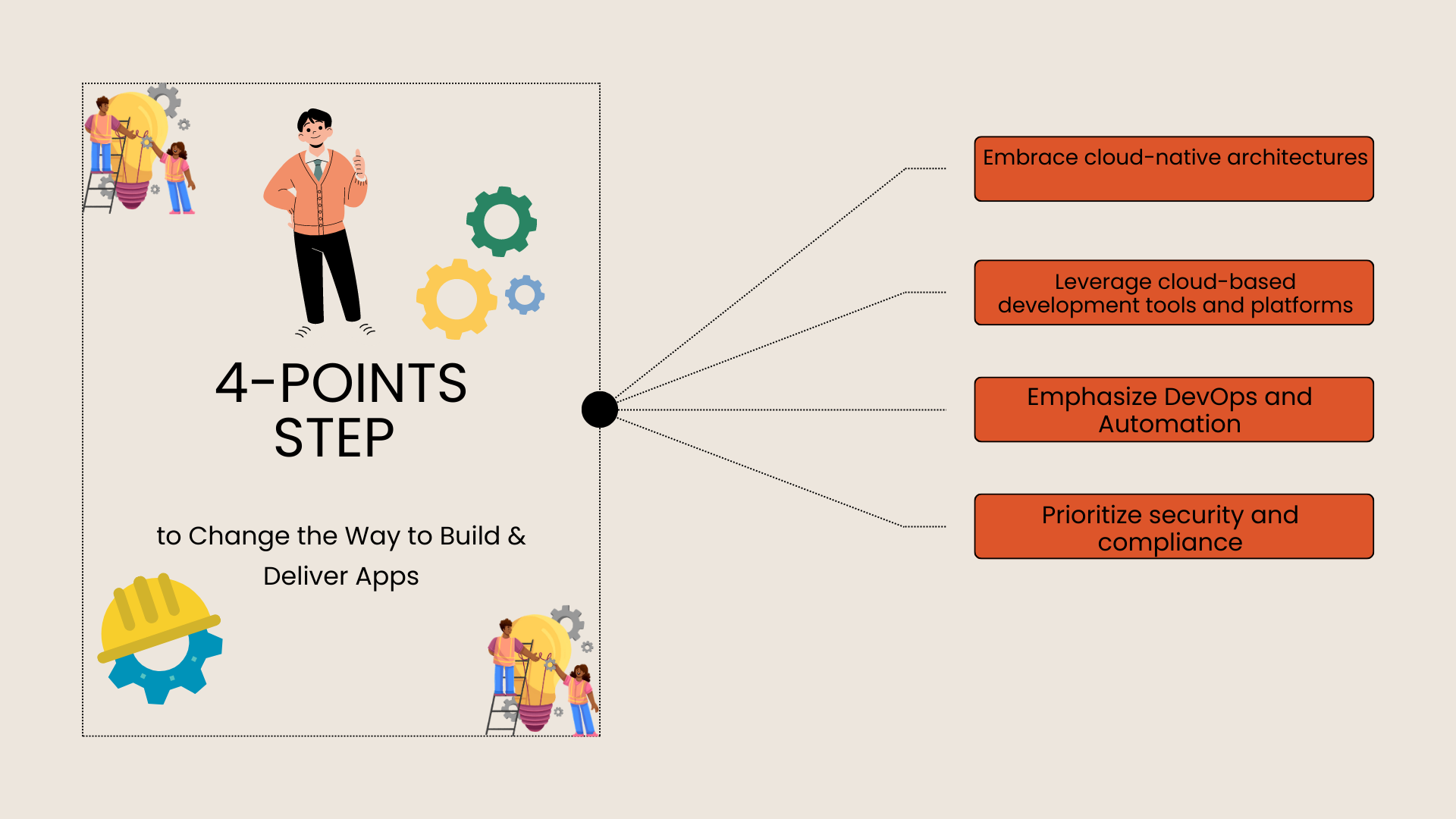Cloud engineering is rapidly transforming the way we build and deliver applications. As more businesses embrace cloud computing, the demand for skilled cloud engineers is skyrocketing. According to recent research by the Synergy Research Group, the cloud infrastructure services market grew by 35% in 2021, reaching a record-breaking $130 billion in revenue. This growth is a clear indication that cloud engineering is no longer just a trend, but a fundamental shift in the way we approach application development and delivery.
In Q4-2022, Microsoft has seen a significant increase in its global market share among the major cloud providers. Its current market share stands at 23%, which is higher than the average of 21% in the previous four quarters. Amazon, the market leader, has maintained its market share range of 32-34%, while Google's market share has remained steady at 11% compared to the previous quarter, but has increased by one percentage point from the same period last year. Collectively, these three companies now account for 66% of the global market, up from 63% a year ago.

In this article, we'll delve into the benefits of cloud engineering and how it's changing how we build and deliver applications. We'll discuss how cloud engineering makes it easier to scale and optimize applications, streamline development workflows, and improve overall performance, reliability, and ROI. So let's get started!
Building and Delivering Applications on the Cloud: Addressing the Pain Points
Traditional application development and delivery methods can be slow, costly, and inflexible. Some of the pain points of traditional methods are-
- Slow time-to-market: Traditional application development and delivery methods can be slow and time-consuming, leading to delays in getting products or services to market.
- Limited scalability: Scaling traditional applications to meet changing business needs can be difficult and costly, often requiring significant infrastructure investments and long lead times.
- High costs: Traditional application development and delivery methods can be expensive, with costs associated with hardware, software licenses, and ongoing maintenance.
- Security risks: Traditional methods may not have robust security measures in place, leaving applications vulnerable to cyber-attacks and data breaches.
- Lack of flexibility: Traditional methods can be inflexible, making it challenging to respond quickly to changing business needs and customer demands.
That's where cloud engineering comes in. By leveraging cloud computing technologies, businesses can build and deliver applications faster, with greater scalability, security, and reliability.
Why Move from the Status Quo and Adopt cloud engineering?
Industry data and experts explain the many benefits that come with cloud engineering-
According to a report by Gartner, "Cloud computing will become the default option for software deployment by 2025." The report notes that cloud-based application development and delivery methods can improve agility, reduce costs, and increase scalability.
A Forbes article highlights that businesses that adopt cloud engineering practices can benefit from "faster innovation, more efficient resource allocation, and higher customer satisfaction." Cloud engineering can enable businesses to be more responsive to changing market conditions and customer demands.
The Wall Street Journal reports that companies that adopt cloud engineering practices can achieve "greater speed, flexibility, and agility in their application development and delivery processes." Hence, cloud engineering can also enable businesses to reduce costs and improve security.
Overall, these statements from industry experts suggest that businesses that adopt cloud engineering practices can benefit from improved agility, scalability, cost savings, security, and customer satisfaction, among other things.
Embracing Cloud Engineering: 4-Steps to Change the Way to Build & Deliver Apps

Step 1: Embrace cloud-native architectures
Cloud-native architectures are designed to take full advantage of cloud computing technologies, enabling businesses to build and deploy applications faster and more efficiently. These architectures typically rely on containerization, microservices, and serverless computing, which can help to improve scalability, reliability, and flexibility. Companies like Amazon and Google have been early adopters of cloud-native architectures, using them to build and deliver their own services and platforms.
Step 2: Leverage cloud-based development tools and platforms
Cloud-based development tools and platforms can help to streamline the application development process, allowing teams to collaborate more effectively and speed up time-to-market. For example, Amazon Web Services (AWS) offers a range of development tools and platforms, including AWS CloudFormation, AWS Elastic Beanstalk, and AWS Lambda, which can help businesses to build and deploy applications in a more agile and scalable way.
Step 3: Emphasize DevOps and Automation
DevOps and automation are key components of cloud engineering, enabling businesses to automate routine tasks and accelerate the development and deployment of applications. By adopting DevOps practices, teams can work together more effectively, sharing knowledge and resources to build better applications faster. Amazon is known for its DevOps culture, which emphasizes automation, continuous integration, and continuous delivery to speed up the development and deployment process.
Step 4: Prioritize security and compliance
Security and compliance are critical considerations when building and delivering applications in the cloud. Businesses need to ensure that their applications are secure, compliant with industry regulations, and can withstand cyber-attacks and data breaches. Amazon has invested heavily in security and compliance measures for its cloud services, offering a range of tools and services to help businesses protect their applications and data.
Companies like Amazon have set the standard for these practices, demonstrating how cloud engineering can help businesses to stay competitive and innovate in today's fast-paced digital landscape. Werner Vogels, the CTO of Amazon, has spoken extensively about the benefits of cloud-native architectures and the importance of DevOps and automation. He has emphasized the need for businesses to be agile and flexible in order to adapt to changing customer needs and market conditions and has argued that cloud engineering is key to achieving this.
Leveraging Cloud Engineering for Better ROI (Return on Investment)
There are significant ROI benefits to adopting cloud engineering practices. By reducing costs and improving efficiency, businesses can achieve a positive ROI and see a significant return on their investment in the cloud. For example-
A study by Nucleus Research conducted in 2018 found that cloud applications deliver 1.7 times more ROI than on-premise applications. The study also found that cloud applications deliver 55% lower TCO (total cost of ownership) than on-premise applications.
Forrester Consulting Report on Cloud Engineering Practices, 2019 found that businesses that adopt cloud engineering practices can achieve an ROI of 208% over three years. The report also found that businesses that adopt cloud engineering practices can reduce application development costs by 20-30%.
A survey by LogicMonitor conducted in 2019 found that businesses that adopt cloud engineering practices can reduce infrastructure costs by 25-50%.
Recap
Cloud engineering is changing the way we build and deliver applications. By adopting cloud engineering practices such as DevOps, automation, and cloud-native architectures, businesses can build and deliver applications faster and more efficiently, while also improving scalability, reliability, and security.
Research has shown that there are significant ROI benefits to adopting cloud engineering practices, including lower TCO, reduced infrastructure costs, and improved application development efficiency. As the demand for digital services continues to grow, businesses that embrace cloud engineering are likely to be better positioned to meet customer needs and succeed in the marketplace.
If you are looking to transform your application development and delivery process to take advantage of the benefits of the cloud, contact Valuebound, a leading provider of cloud-native software engineering services and an AWS consulting partner.
Our experienced team can help you adopt cloud engineering practices and build scalable, reliable, and secure applications in the cloud, so you can stay ahead of the competition and meet the needs of your customers. Contact us today to learn more.





